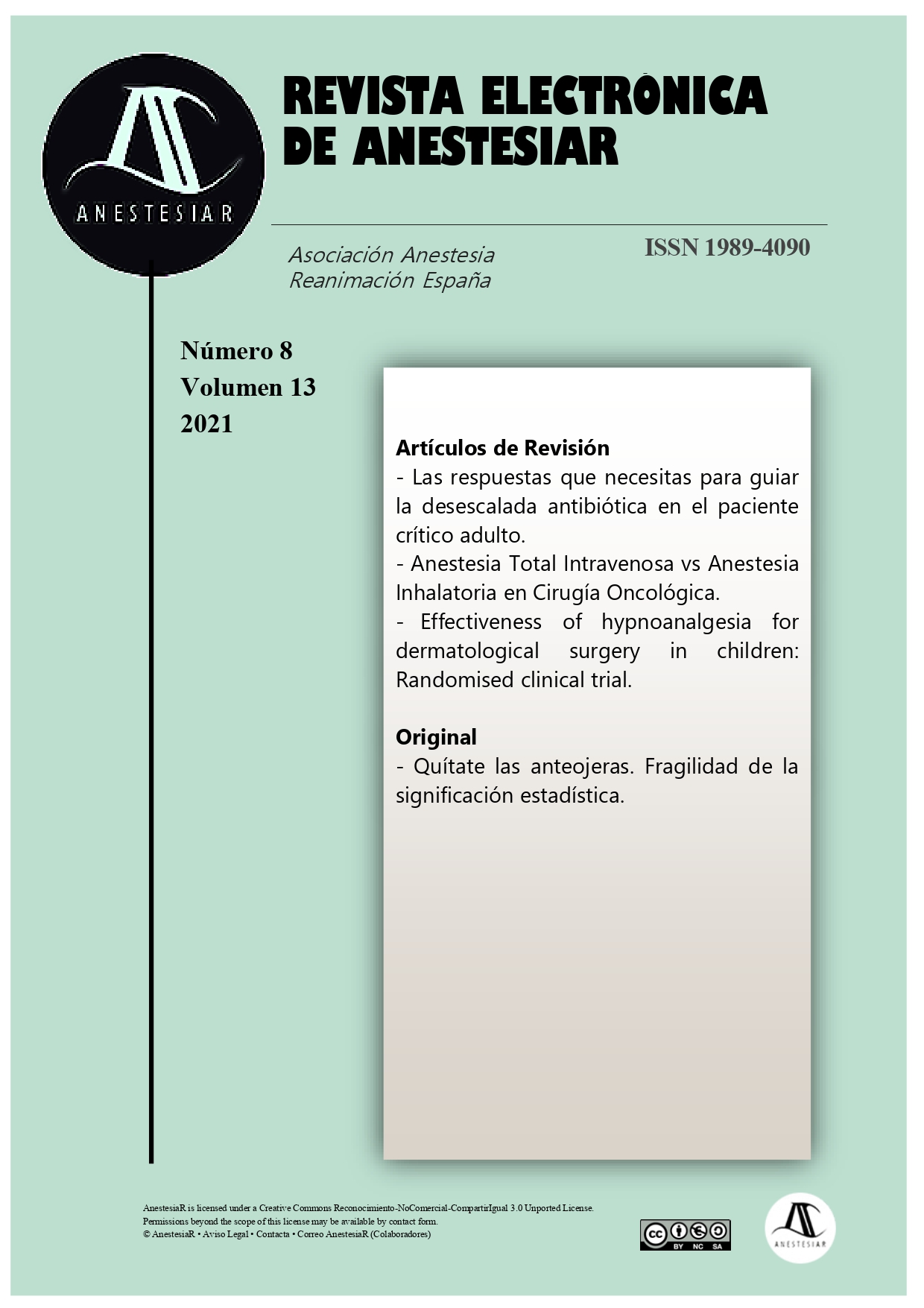The answers you need to guide de-escalation in critically ill patients
DOI:
https://doi.org/10.30445/rear.v13i8.911Keywords:
Antimicrobial De-escalation, Antimicrobial Resistance, Critically ill patientAbstract
Despite antimicrobial de-escalation is recognized as an important aspect of antimicrobial stewardship programs, there is scarce evidence on how it must be done in Intense Care Units. This guide, made by experts, tries to give practical answers about it.
References
- Surviving Sepsis Campaign: International Guidelines for Management of Sepsis and Septic Shock: 2016 | SpringerLink [Internet]. [cited 2020 Feb 9]. Available from: https://link.springer.com/article/10.1007%2Fs00134-017-4683-6
- Tabah A, Cotta MO, Garnacho-Montero J, Schouten J, Roberts JA, Lipman J, et al. A Systematic Review of the Definitions, Determinants, and Clinical Outcomes of Antimicrobial De-escalation in the Intensive Care Unit. Clin Infect Dis. 2016 Apr 15;62(8):1009–17.
- On behalf of the OUTCOMEREA Study Group, Weiss E, Zahar JR, Garrouste-Orgeas M, Ruckly S, Essaied W, et al. De-escalation of pivotal beta-lactam in ventilator-associated pneumonia does not impact outcome and marginally affects MDR acquisition. Intensive Care Med. 2016 Dec;42(12):2098–100.
- De Bus L, Denys W, Catteeuw J, Gadeyne B, Vermeulen K, Boelens J, et al. Impact of de-escalation of beta-lactam antibiotics on the emergence of antibiotic resistance in ICU patients: a retrospective observational study. Intensive Care Med. 2016 Jun;42(6):1029–39.
- Gonzalez L, Cravoisy A, Barraud D, Conrad M, Nace L, Lemarié J, et al. Factors influencing the implementation of antibiotic de-escalation and impact of this strategy in critically ill patients. Crit Care Lond Engl. 2013 Jul 12;17(4):R140.
- Leone M, Bechis C, Baumstarck K, Lefrant J-Y, Albanèse J, Jaber S, et al. De-escalation versus continuation of empirical antimicrobial treatment in severe sepsis: a multicenter non-blinded randomized noninferiority trial. Intensive Care Med. 2014 Oct 1;40(10):1399–408.
- Paul M, Dickstein Y, Raz-Pasteur A. Antibiotic de-escalation for bloodstream infections and pneumonia: systematic review and meta-analysis. Clin Microbiol Infect Off Publ Eur Soc Clin Microbiol Infect Dis. 2016 Dec;22(12):960–7.
- López-Cortés LF, Rosso-Fernández C, Núñez Núñez M, Lavín-Alconero L, Bravo-Ferrer J, Barriga Á, et al. Targeted simplification versus antipseudomonal broad-spectrum beta-lactams in patients with bloodstream infections due to Enterobacteriaceae (SIMPLIFY): a study protocol for a multicentre, open-label, phase III randomised, controlled, non-inferiority clinical trial. 2017 [cited 2020 Feb 16]; Available from: https://digital.csic.es/handle/10261/180334
- Tabah A, Cotta MO, Garnacho-Montero J, Schouten J, Roberts JA, Lipman J, et al. A Systematic Review of the Definitions, Determinants, and Clinical Outcomes of Antimicrobial De-escalation in the Intensive Care Unit. Clin Infect Dis. 2016 Apr 15;62(8):1009–17.
- On behalf of the OUTCOMEREA Study Group, Weiss E, Zahar JR, Garrouste-Orgeas M, Ruckly S, Essaied W, et al. De-escalation of pivotal beta-lactam in ventilator-associated pneumonia does not impact outcome and marginally affects MDR acquisition. Intensive Care Med. 2016 Dec;42(12):2098–100.
- De Bus L, Denys W, Catteeuw J, Gadeyne B, Vermeulen K, Boelens J, et al. Impact of de-escalation of beta-lactam antibiotics on the emergence of antibiotic resistance in ICU patients: a retrospective observational study. Intensive Care Med. 2016 Jun;42(6):1029–39.
- Gonzalez L, Cravoisy A, Barraud D, Conrad M, Nace L, Lemarié J, et al. Factors influencing the implementation of antibiotic de-escalation and impact of this strategy in critically ill patients. Crit Care Lond Engl. 2013 Jul 12;17(4):R140.
- Leone M, Bechis C, Baumstarck K, Lefrant J-Y, Albanèse J, Jaber S, et al. De-escalation versus continuation of empirical antimicrobial treatment in severe sepsis: a multicenter non-blinded randomized noninferiority trial. Intensive Care Med. 2014 Oct 1;40(10):1399–408.
- Paul M, Dickstein Y, Raz-Pasteur A. Antibiotic de-escalation for bloodstream infections and pneumonia: systematic review and meta-analysis. Clin Microbiol Infect Off Publ Eur Soc Clin Microbiol Infect Dis. 2016 Dec;22(12):960–7.
- López-Cortés LF, Rosso-Fernández C, Núñez Núñez M, Lavín-Alconero L, Bravo-Ferrer J, Barriga Á, et al. Targeted simplification versus antipseudomonal broad-spectrum beta-lactams in patients with bloodstream infections due to Enterobacteriaceae (SIMPLIFY): a study protocol for a multicentre, open-label, phase III randomised, controlled, non-inferiority clinical trial. 2017 [cited 2020 Feb 16]; Available from: https://digital.csic.es/handle/10261/180334
Downloads
Published
2021-09-06
How to Cite
Cifuentes García, B., Fernández Ruipérez, L., de Capadocia Rosell, J., & Jiménez Vizuete, J. M. (2021). The answers you need to guide de-escalation in critically ill patients. Revista Electrónica AnestesiaR, 13(8). https://doi.org/10.30445/rear.v13i8.911
Issue
Section
Critical reviews of articles
License
Copyright (c) 2021 Revista Electrónica AnestesiaR

This work is licensed under a Creative Commons Attribution-ShareAlike 4.0 International License.
 Envío y derechos de autor
Envío y derechos de autor


 Revista Electrónica AnestesiaR by
Revista Electrónica AnestesiaR by 